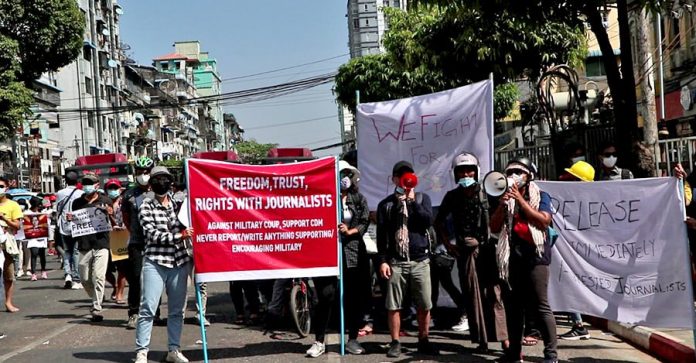Guest contributor
Joseph Andersson
As Myanmar enters the fourth year of the Spring Revolution, the military’s ongoing repression of pro-democracy activists, human rights defenders, and journalists highlights the necessity for resilience in the fight for freedom.
While resilience is often seen as an individual’s ability to endure hardship, it is also a collective force that sustains movements, communities, and civilians facing repression. Collective resilience is at the heart of Myanmar’s resistance, exemplified by Exile Hub, an organisation dedicated to supporting Myanmar human rights defenders and journalists in exile.
Exile Hub understands resilience as a shared strength, one that thrives through mutual support, adaptation, and vulnerability. In contrast to traditional notions that emphasise individual perseverance, the organisation fosters a resilience rooted in collective empowerment – acknowledging struggles and working together in navigating such challenges.
Exile Hub offers a range of mental health and psychosocial support, including individual counseling, peer support groups, and therapeutic workshops in art, music, and yoga. These activities contribute to their broader holistic support system, which encompasses safety, mental health, professional development, and advocacy – ensuring that those on the frontlines of human rights work can continue their vital efforts with long-term sustainability in mind.
A key initiative within Exile Hub is the “Expanding Resilience Together” workshops, held monthly in northern Thailand. These workshops provide a dedicated space for exiled human rights defenders and journalists to explore the intricacies of resilience.
Topics include understanding trauma, recognising burnout, identifying signs of depression, and adopting suitable coping strategies. These sessions celebrate the courage it takes to acknowledge struggles, seek help, and embrace vulnerability as a form of strength.
Exile Hub’s six-month mentorship program for women journalists builds on this foundation by helping exiled journalists who are dealing with gender-based discrimination and violence, financial instability, and restrictive immigration policies. These challenges have led to professional isolation and concerningly high dropout rates among women in Myanmar’s independent media sector.
To counteract this, Exile Hub arranges small mentorship groups between experienced women journalists and early-career professionals, offering them career guidance, professional development, and access to networks that strengthen their positions within the exiled Myanmar media sector.
Through mentorship, participants gain confidence in navigating their careers, reinforcing the idea that resilience is cultivated through shared experience and collective empowerment.
As one participant shared:
“The opportunity to connect with like-minded professionals and develop context-specific resources has given me new skills in mental resilience. My peers have also helped me recognise the importance of a work-life balance. This experience has strengthened my well-being, career development, and ability to create actionable change within my community.”
Despite continuous efforts to support Myanmar’s democracy movement, the international funding landscape has taken a dramatic U-turn in the past several weeks. Following the U.S. government’s executive order to reassess and realign foreign aid, Exile Hub and its partners have had to adjust their programming.
According to Human Rights Myanmar, $39 million in USAID funding designated for human rights, democracy, and media development in Myanmar has been suspended for a 90-day review, concluding on April 20.
This sudden financial setback jeopardises humanitarian aid and independent media operations. Organisations already operating under severe financial constraints have been forced to make difficult decisions, including staff layoffs, program suspensions, and substantial reductions in essential services.
Some smaller organisations have already ceased operations indefinitely. Given the current trajectory, additional organisations are unlikely to withstand this funding freeze. Even if financial support is restored in April, the prolonged suspension will make it difficult to resume previous operations.
Should these funds be permanently rescinded, the long-standing civil society infrastructure could collapse, significantly undermining opposition to military rule at an important juncture.
This crisis underscores the urgency for collective resilience; the ability for networks and movements to withstand shocks by sharing resources, knowledge, and strategies. While individual resilience is crucial, no activist or organisation can sustain their work in isolation. Without sustained support structures, entire movements risk collapse.
To mitigate the impact of funding cuts, Exile Hub and its partners are actively fostering cross-organisational collaboration.
By strategically pooling resources, sharing technical expertise, and engaging in coordinated advocacy efforts, organisations supporting Myanmar’s fight for democracy in exile are developing alternative models that reduce dependence on a single funding source.
This collaborative framework strengthens collective resilience, ensuring the sustained provision of essential services for Myanmar’s human rights defenders.
At its core, resilience is not just about surviving crises, but about adapting to them and ensuring long-term sustainability.
Coordination of humanitarian aid, independent reporting, and other forms of support for Myanmar endures not because of individual acts of heroism, but because of the collective determination of those who refuse to be silenced.
This has been sustained by the collective strength of those who help one another, and this resilience will continue to drive the support forward.
Now, more than ever, international allies, funders, and advocacy groups must step up to ensure Myanmar’s civil society does not stand alone.
Through renewed financial commitments, long-term infrastructure investments, and collaborative resource mobilisation, we can ensure that the fight for democracy in Myanmar does not falter, but emerges stronger and more resilient in the face of adversity.
Joseph Andersson is the Impact Team Lead at Exile Hub, where he oversees monitoring, evaluation, and program development. He is dedicated to amplifying the voices of exiled human rights defenders by ensuring their needs and experiences are reflected in the programs and advocacy work that Exile Hub pursues.
DVB publishes a diversity of opinions that does not reflect DVB editorial policy. We’d like to hear what you think about this or any of our stories: [email protected]



